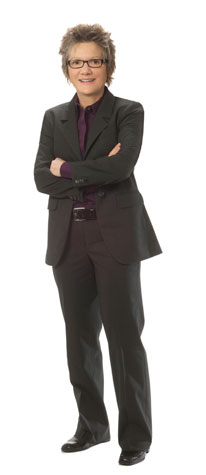 Mary Daly (B.A. ’85)
Mary Daly (B.A. ’85)
Defying the Odds
Daly is one of the nation’s leading scholars in economics and public policy, a career that belies her life’s journey. To help support her struggling family, she began working at an early age, eventually dropping out of school at age 15 to work full-time. Despite many obstacles, Daly found adults who encouraged her and nurtured her intellect. She earned a GED and enrolled at UMKC. Today, she is group vice president and the associate director of research at the Federal Reserve Bank of San Francisco, where she has built a 15-plus year career. In addition to numerous scholarly articles, Daly has authored two books and produced several videos and online tools designed to educate the general public about economics.
What was special or memorable about your education at UMKC?
The professors I came in contact with. I’m a kid with a GED and I get there and they’re teaching me to be a scholar and critical thinker and to have a much broader view of my life than I came in with. It was the enthusiasm with which they grappled with issues and pursued their subject and pursued the truth. They were driven to know more and be curious, and I just loved that. It was a remarkable experience for me.
You did overcome enormous odds to build your career – what motivated you to work so hard?
I watched people around me who were making a difference in a big way, in politics or running large organizations, and I wanted to be involved with people like that. I was really focused on making a contribution, and the only path to that is you have to get the education, so I was driven to get the education. That’s what drove me when it got hard.
Your work focuses on some of our nation’s most vexing issues, from Social Security to globalization. If you could set three national priorities for addressing our long-term economic future, what would they be?
First is to educate and invest in youth. We need to build a stronger, more-educated workforce. That’s a top national priority that doesn’t get the attention it needs.
Second, we need to focus on creating an affordable and fair social contract – something that involves Social Security, health care, Medicare. Basically rethinking the social contract like we did in the New Deal. It’s a different economy now, so we need to ask, is the safety net what it needs to be, and what can we afford? And if not, how do we change it?
And we need to reorient the political discussion – make it about building, not battling. We need to focus on building our society out.
